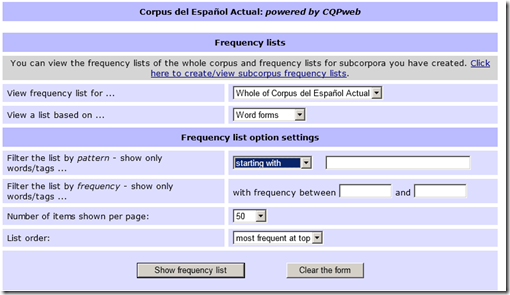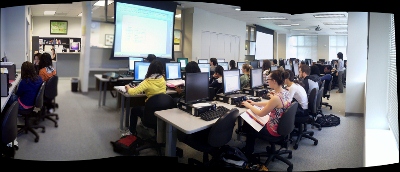Archive
Arachne, online database for archaeology
“ARACHNE is the free [account creation required] object database of DAI and the Institut of Classical Archaeology in Cologne. It provides more than 1 Million images of finds, architecture and excavations with meta information as well as digitised historical literature” (http://www.ariadne-infrastructure.eu/Services/Online-Services: Find more information and help on this page). Example of Advanced Search start choice page: 
Continue with Einzelmotive (singular motifs) (gets you back into an English interface also – the field-specific explanation on the right certainly helps): 
There is auto-search completion/suggestion, however, it seems to work only for German, and very eclectic: 

Beats having to plaster your surroundings with photos for making your own panoramas. ![]()
MyGermanLab shortlinks and step-by-step chapter test for GERM1201, GERM1202 classes
- Using Internet Explorer, go here: goo.gl/JUSUC.
- Log into MyGermanLab.
- to open your test:
-
- to handle multimedia:
- Use the headsets hanging behind the screens for questions that require listening/speaking.
- There is a step-by-step guide on how to record here.
- If you get an error for the audio recorder saying “Authentication failed”, keep calm and carry on, your recording is not lost, you only cannot review it anymore:

- If you have a question, do not disturb others. Rather put your headsets on and get in the queue by clicking button: “Call” in this window
 . Your call will be answered shortly.
. Your call will be answered shortly.
- Please be advised that this exam is
- proctored and that your screen can be seen by the proctor at any time.
- randomized, so that your neighbors’ screen will most likely display your current test question at a quite different time.
Shortlinks for RUSS1201, RUSS1202 classes with Sanako Study 1200
|
1 |
sanako-study-1200;students;teachers;intro;cheatsheet;faqs;screencasts |
|
|
2 |
russian;students;writing;teacher |
|
|
3 |
sanako-study-1200;students;teachers;intro;cheatsheet;faqs |
|
|
4 |
sanako-study-1200;teachers;intro;cheatsheet;faqs |
Or use OSK: https://thomasplagwitz.com/tag/osk/o
Corpus del Español Actual (CEA)
-
Link:

- Example of KWIC view result:

- Based on Europarl, Wikicorpus (2006!), MultiUN. From their metadata page:
Metadata for Corpus del Español Actual
Corpus name
Corpus del Español Actual
CQPweb’s short handles for this corpus
cea / CEA
Total number of corpus texts
73,010
Total words in all corpus texts
539,367,886
Word types in the corpus
1,680,309
Type:token ratio
0 types per token
Text metadata and word-level annotation
The database stores the following information for each text in the corpus:
There is no text-level metadata for this corpus.
The primary classification of texts is based on:
A primary classification scheme for texts has not been set.
Words in this corpus are annotated with:
Lemma (Lemma)
Part-Of-Speech (POS)
WStart (WStart)
The primary tagging scheme is:
Part-Of-Speech
Further information about this corpus is available on the web at:
- To use, “consult the IMS’s brief description of the regular-expression syntax used by the CQP and their list of sample queries. If you wish to define your query in terms of grammatical and inflectional categories, you can use the part-of-speech tags listed on the CEA’s Corpus Tags page.”
- Also provides frequency data (based on word forms or lemmas, and others – up to a 1000):

- Examples of a frequency query result (click for full-size image. Note that a lemmatized list was requested here which links all inflected forms back to the lemma, and vice versa, upon clicking the lemma, displays a KWIC view containing all forms subsumed under that lemma, see picture above):

Links explaining Copyright
- Code of Best Practices in Fair Use for Academic and Research Libraries. A librarian’s write-up that can also be very useful for Learning Centers that handle learning material media (but would it be possible to run this through MS-Word to “down-design” and add a table of contents instead?).
- Notable:
- “It is fair use to make digital copies of collection items that are likely to deteriorate, or that exist only in difficult-to-access formats, for purposes of preservation, and to make those copies available as surrogates for fragile or otherwise inaccessible materials. LIMITATIONS: Preservation copies should not be made when a fully equivalent digital copy is commercially available at a reasonable cost. Libraries should not provide access to or circulate original and preservation copies simultaneously”.
Find open access research on teaching modern foreign languages with Yazik Open
An inititative of an expert from the UK LLAS, Yazik Open has the potential to become a welcome addition to our SLA research search options, especially if you do not want to run into a pay wall after finding an interesting abstract.
The currently sole contributor seems to be admin – same problem I had when I started a language learning resource links database in 1998, when will this change?
The keyword list looks somewhat rudimentary – when I worked with LLAS on a language learning resource metadata schema, complexity led to a grinding halt.
So the need to bring some of the advances in technologically fostered collaboration and information exchange to domain-specific fields like SLA certainly remains to be felt here.








